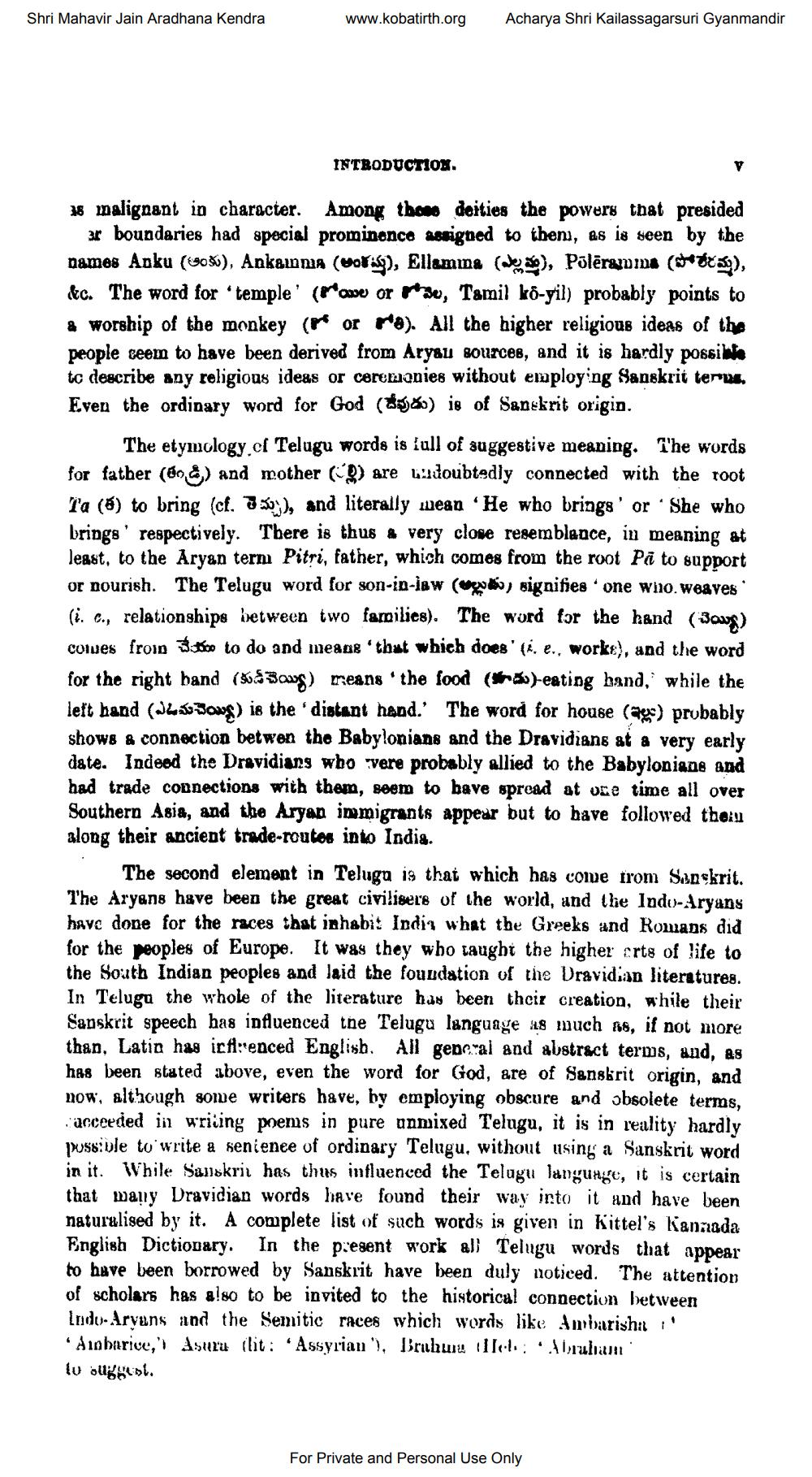________________
Shri Mahavir Jain Aradhana Kendra
www.kobatirth.org
INTRODUCTION.
*
Acharya Shri Kailassagarsuri Gyanmandir
18 malignant in character. Among these deities the powers that presided ar boundaries had special prominence assigned to them, as is seen by the names Anku (90%), Ankanna (cor), Ellamma (J), Pōlēramma (*FK), &c. The word for 'temple (owe ore, Tamil kô-yil) probably points to a worship of the monkey (or ). All the higher religious ideas of the people seem to have been derived from Aryau sources, and it is hardly possible to describe any religious ideas or ceremonies without employing Sanskrit terus. Even the ordinary word for God () is of Sanskrit origin.
V
The etymology of Telugu words is full of suggestive meaning. The words for father (6) and mother (9) are undoubtedly connected with the root Ta (5) to bring (cf. ), and literally mean 'He who brings or She who brings respectively. There is thus a very close resemblance, in meaning at least, to the Aryan term Pitri, father, which comes from the root Pa to support or nourish. The Telugu word for son-in-law () signifies one who. weaves (i. c., relationships between two families). The word for the hand (Bog) comes froin to do and means that which does' (A. e., works), and the word for the right band (53) means 'the food ()-eating hand, while the left hand (oog) is the 'distant hand.' The word for house (g) probably shows a connection betwen the Babylonians and the Dravidians at a very early date. Indeed the Dravidians who were probably allied to the Babylonians and had trade connections with them, seem to have spread at one time all over Southern Asia, and the Aryan immigrants appear but to have followed the along their ancient trade-routes into India.
The second element in Telugu is that which has come from Sanskrit. The Aryans have been the great civilisers of the world, and the Indo-Aryans have done for the races that inhabit India what the Greeks and Romans did for the peoples of Europe. It was they who taught the higher arts of life to the South Indian peoples and laid the foundation of the Dravidian literatures. In Telugu the whole of the literature has been their creation, while their Sanskrit speech has influenced the Telugu language as much as, if not more than, Latin has inflrenced English. All general and abstract terms, and, as has been stated above, even the word for God, are of Sanskrit origin, and now, although some writers have, by employing obscure and obsolete terms, acceeded in writing poems in pure unmixed Telugu, it is in reality hardly possible to write a sentence of ordinary Telugu, without using a Sanskrit word in it. While Sanskrit has thus influenced the Telugu language, it is certain that many Dravidian words have found their way into it and have been naturalised by it. A complete list of such words is given in Kittel's Kannada English Dictionary. In the present work all Telugu words that appear to have been borrowed by Sanskrit have been duly noticed. The attention of scholars has also to be invited to the historical connection between Indo-Aryans and the Semitic races which words like Ambarisha 'Ainbarice,' Asura (lit: Assyrian), Brahua Heb
Abraham '
to suggest.
For Private and Personal Use Only




